
Screenplay
Comrade Washington, a black struggle activist, returns to South Africa to work with convicts to create a musical play. Through personal testimony, song, and dance, the prisoners find resilience, liberation and forgiveness.

Director
Comrade Washington, a black struggle activist, returns to South Africa to work with convicts to create a musical play. Through personal testimony, song, and dance, the prisoners find resilience, liberation and forgiveness.

Bra Stone
The gangster Manysia is given a second chance after his release from prison. Reverend Jacob Musi takes him under his wings, both as a promise to Manysia’s father and as an act of benevolence. Reverend Jacob thinks that everyone deserves a fresh start and his family generously welcomes Manysia, especially the reverend’s son. But soon the past will cast its shadows over them again.

Sabela
The plot centers on students involved in the Soweto Riots, in opposition to the implementation of Afrikaans as the language of instruction in schools. The stage version presents a school uprising similar to the Soweto uprising on June 16, 1976. A narrator introduces several characters among them the school girl activist Sarafina. Things get out of control when a policeman shoots several pupils in a classroom. Nevertheless, the musical ends with a cheerful farewell show of pupils leaving school, which takes most of act two. In the movie version Sarafina feels shame at her mother's (played by Miriam Makeba in the film) acceptance of her role as domestic servant in a white household in apartheid South Africa, and inspires her peers to rise up in protest, especially after her inspirational teacher, Mary Masombuka (played by Whoopi Goldberg in the film version) is imprisoned.

Screenplay
The plot centers on students involved in the Soweto Riots, in opposition to the implementation of Afrikaans as the language of instruction in schools. The stage version presents a school uprising similar to the Soweto uprising on June 16, 1976. A narrator introduces several characters among them the school girl activist Sarafina. Things get out of control when a policeman shoots several pupils in a classroom. Nevertheless, the musical ends with a cheerful farewell show of pupils leaving school, which takes most of act two. In the movie version Sarafina feels shame at her mother's (played by Miriam Makeba in the film) acceptance of her role as domestic servant in a white household in apartheid South Africa, and inspires her peers to rise up in protest, especially after her inspirational teacher, Mary Masombuka (played by Whoopi Goldberg in the film version) is imprisoned.

Theatre Play
The plot centers on students involved in the Soweto Riots, in opposition to the implementation of Afrikaans as the language of instruction in schools. The stage version presents a school uprising similar to the Soweto uprising on June 16, 1976. A narrator introduces several characters among them the school girl activist Sarafina. Things get out of control when a policeman shoots several pupils in a classroom. Nevertheless, the musical ends with a cheerful farewell show of pupils leaving school, which takes most of act two. In the movie version Sarafina feels shame at her mother's (played by Miriam Makeba in the film) acceptance of her role as domestic servant in a white household in apartheid South Africa, and inspires her peers to rise up in protest, especially after her inspirational teacher, Mary Masombuka (played by Whoopi Goldberg in the film version) is imprisoned.

Writer
Five black men in South Africa end up in jail - for crimes which range from shooting a security policeman to sleeping with a white boss's wife. What they all share is the conviction that the 'Day of Reckoning' is at hand.

In this backstage documentary produced for the television program Everyman, Percy Mtwa and Mbongeni Ngema discuss how they came to create their play Woza Albert!. The commentary is intercut with sketches from the play and footage of the locations and events on which the play is based.






